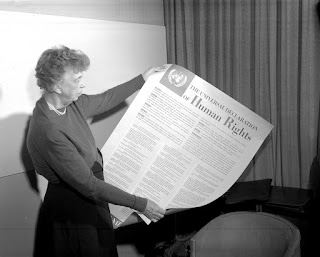Today's view
Hi everyone! Today we ar going to deal with an actual subject in the field of Human Rights and in particular, in the field of our already known Economic Conditionality. This subject will answer the following questions: Where do we find Economic Conditionality now? Is important Economic Conditonality from an actual point of view?
Since the
adoption of the Universal Declaration of Human Rights in 1948, international
human rights law has evolved, seeking answers to new challenges, expanding the
list of rights, progressing in protection tools. Sometimes we think it
is a "weak" right, undemanding, with little force to enforce, but has
made and continues to make important contributions to build a more dignified,
fairer and more peaceful international community.
Here you also have a video that explains in a deeper way the content of the Universal Declaration of Human Rights that we have mentioned.
With the
emergence of the phenomenon of globalization and the verification of the
existence of global problems that exceed the individual and the State, have
begun to take the first steps in the development of a new generation of human
rights in the international order, rights whose owner is the community, as is
the case of human rights to development, peace and solidarity. Each of these
rights, to the extent that they achieve international recognition, establishes
obligations to the States and pushes to bring us closer to this
more just society.
At present,
work is being done to define the human right to solidarity, which is based on
art. 28 of the Universal Declaration of Human Rights: "Everyone has the
right to establish a social and international order in which the rights and
freedoms proclaimed in this Declaration are fully effective."
The Human Rights Council ,despite the opposition of some of its most powerful members,
such as the United States, the United Kingdom, Germany and France, has
recently pointed out that international solidarity is a fundamental component
for performing the right to development of people and promote the full
enjoyment of economic, social and cultural rights for erveryone and that,
however, has received insufficient attention.
It also notes with concern the
widening of the inequality gap and the failure to comply with the commitment
made in 1971, when the Second United Nations Development Decade was
established, that developed countries dedicate 0.7% of GDP to development aid.
Considers that solidarity must be a new foundational principle of contemporary
international law and a fundamental value for international relations in the
21st century, since global problems must be addressed in such a way that costs
and burdens are distributed fairly, according to the fundamental principles of
equity and social justice, and that those who suffer, or those who benefit
least, deserve the help of the most benefited.
We give you here an actual new that will define better the subject of International Solidarity.
And we also give you here another new from The Guardian in relation of the dedication of the 0,7% of the GDP of developed countries according to the Second United Nations.
As always, we leave you the links that carry the complete explanation of the concept that will help you to understand it better and to know additional information on the subject.
To get complementary information, you can watch this video which is about "Trade Unions and International Solidarity":
https://www.amnesty.org.uk/trade-unions-and-human-rights
To get complementary information, you can watch this video which is about "Trade Unions and International Solidarity":
https://www.amnesty.org.uk/trade-unions-and-human-rights
Thank you very much for continuing reading our blog! Any doubt, please write a comment and we will answer you as soon as possible.



Comentarios
Publicar un comentario